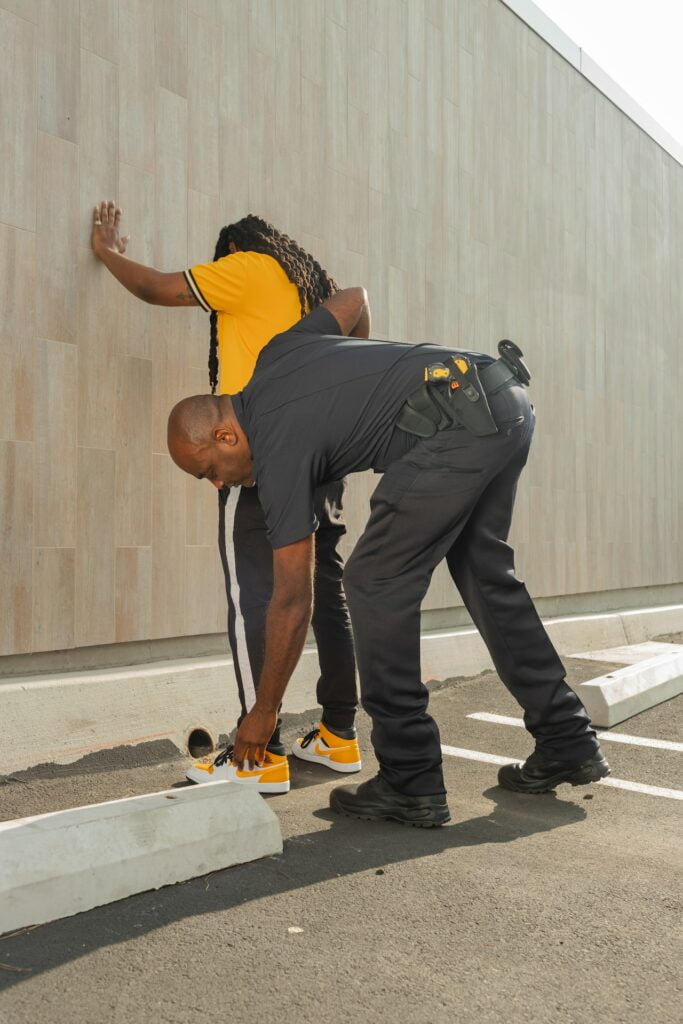What happens when you get arrested?
Unfortunately, most people find out the hard way. Television does a lot to shape (or perhaps, misshape) our perception of the legal system, and getting arrested is something most of us don’t really think about until it happens.
Some shocking statistics: Did you know that the average man has a 52% chance of being arrested in his lifetime?
Don’t think you’re out of the woods, ladies — according to the Bureau of Justice Statistics’ most recent report, female arrest rates have been steadily increasing since 1990.
These are startling numbers that should make this article a must-read for anyone who “prepares for the worst and hopes for the best.”

effects arrest san pedro criminal defense attorney
So how can this be? A 52% chance of being arrested in one’s lifetime?! Those are Vegas-type odds where the Justice Department is the “house” and the “house” always wins. There is a confluence of catalyzing factors in the very tense times we’re living in: privatized prisons incentivize arrest, the school-to-jail track, police training is often “less personable” and more militarized, and the desensitization toward violence by the media all factor in, not to mention economic strain and the evaporating middle class in this country. Think tanks could spend years trying to really pin down a solid answer, but the fact of the matter is, you are at significant risk of being arrested for something at some time in your life and you should know what to expect.
So what happens when you get arrested? We live in a system where every suspect and defendant is considered “innocent until proven guilty,” but what are the consequences of being arrested for the innocent defendant or misdemeanor, “low-level” offender?
For the sake of discussion, let’s imagine an “average Jane,” living a middle-class lifestyle, paycheck-to-paycheck. Like a
of mine, Jane gets arrested for “domestic assault” after a heated argument with her boyfriend turns physical and police are called to the scene.
Legal Effects of Arrest
In a best case scenario, the defendant is taken into custody, read her Miranda rights (which most people unwisely waive – a topic for another day) and then questioned about the facts surrounding the alleged crime. Jane thinks she’s doing herself a favor by explaining to the cops that she was provoked and the guy deserved to be slapped. Bad plan, Jane. Each state trains police differently regarding domestic violence: some states have mandatory arrest provisions with regard to domestic calls.
That means that if the officer has probable cause to suspect a crime has been committed, he/she MUST make an arrest. When you consider that any unwanted or potentially threatening physical contact is construed as assault, these statistics start to make a little more sense. Other states, like California for example, (where I practice) have “preferred arrest provisions” that give the officer a little more freedom to make a judgement call, but that also presents greater risk to the officer’s job and/or department so, practically speaking, arrests in California can be just as likely as in states with mandatory arrest provisions.So Jane gets arrested under a preferred arrest provision. Bail is set, per the Los Angeles County 2015 Bail Schedule, at $20,000 for domestic battery. This means that if she wants to go home before arraignment, she’ll have to come up with 10%, or $2,000 in our example. Regardless of what happens in the case, the defendant never gets that money back. Do you have $2000 laying around you wouldn’t mind parting with because you thought calling the cops would “show him what’s what?” Jane doesn’t, so she’s stuck in jail for up to two court days (which can be up to five calendar days) before she gets to see a judge. The police will often tell a defendant that they’re likely to be released, so many defendants do not use their phone call wisely to alert a family member or attorney to the situation — and that’s assuming the defendant even has a family member or attorney to call.When Jane does finally see a judge, she enters a plea of “not guilty” and asks for the bail to be reduced, or to be released on her own recognizance (“OR release“). The judge has the discretion to deny these requests.
What happens if he does? Jane is denied any bail reduction and is now stuck in jail until the next court appearance — which can be several weeks away! Now, Jane is not entitled to any phone calls and may be kept in an area of the jail without access to phones, at the complete discretion of the Sheriff’s department.
At the next appearance, most often the case is either dismissed or a plea agreement is entered. In Jane’s case, because she essentially confessed, she takes a plea deal, and is sentenced to probation with time served, payment of fines and fees, possible restitution, and anger management classes that she has to pay for. Then, she is released to go home.
A lot of people don’t realize, until they’re in this situation, how much pressure they feel to just take a plea deal, even if they believe they are innocent of the crime and likely to be exonerated. The reality is, you’re gambling with your future at that point: you have to consider the possibility that, for some unforeseen reason, you may actually get convicted by a jury, in which case you’re looking at a possible jail sentence of 1 year for a simple misdemeanor, plus sizeable fines and, depending on the charge, community service and/or classes (anger management, parenting etc). I’ve had clients who I knew would’ve won their case had they gone the distance and brought it before a jury, but they decided to take the plea deal to ease the stress and feel like they finally ended the nightmare they never saw coming.

Collateral Effects of Arrest
While Jane was being subjected to the humiliation and poor conditions of the L.A. County Jail, she essentially disappeared from society for about a month.She didn’t show up for work and has likely been fired — even if a family member knows what’s going on, many people want to avoid their employer knowing that they’re in jail.
Rent has not been paid and eviction proceedings may have begun. Bills have not been covered and late fees are accruing, resulting in freezes on credit cards and possibly overdrawn bank accounts.
Jane has missed social events that she was expected to attend, affecting her relationships with friends and family. To avoid social stigma, a defendant may not want to admit to others that she has missed all of these important life activities because she was under arrest.
So now with no job, her home in jeopardy, ruined credit, damaged relationships, and large fines and court costs to pay, what does society expect this low-level offender to do?

denied job criminal record san pedro attorney
Jane goes to apply for another job and now has to check “yes” on the job application when asked if she’s ever been convicted of a crime. Once she’s off probation, she can get the conviction expunged, which few people ever actually do. Until then, she has a record that she must disclose. Many employers won’t look into a candidate any further once they see that conviction box checked. Additionally, Jane has a less-than-stellar recommendation from her old boss who fired Jane after several days of no-call/no-shows. After trying for some time, Jane finds a job working for a smaller company that doesn’t do background checks and/or is willing to take a chance.
Jane begs her landlord for some time to catch up on the missed rent, but ends up agreeing to leave rather than fight the eviction in court. Then, Jane goes to rent another apartment, but now she has an unlawful detainer on her record and her credit is blemished. Thankfully, Jane got out of jail in time to avoid having her furniture and belongings sold to pay off the back rent; some defendants are not so fortunate after an arrest.
Jane slowly rebuilds her life and attends several court hearings over the next year for progress reports on her anger management classes and payment of her fines and fees. Her summary probation expires after three years, so for the next three years she’s walking on eggshells because any probation violation is tantamount to being convicted of the original crime and carries with it the full sentence. She also has no right to refuse any search by law enforcement during the time that she is on probation.
In the end, Jane was able to put her misdemeanor arrest behind her and go on to live a productive life. However, the system is not designed to make that easy and many never recover like Jane. People rarely think about the collateral effects of an arrest… until they are arrested and have to navigate the system for themselves.
It’s getting easier and easier for the sort of nightmare I just described to become a reality. In Jane’s case, she didn’t commit a horrible crime but rather an honest mistake… something you see on television everyday that makes for good drama. If this sort of thing happens to you, yes – I know what to do to mitigate most of these collateral effects and we can talk about that if/when the time comes, but I got into the practice of law because I want to see less of this sort of thing, not more of it. Our society has laws upon laws that don’t really seem to reflect the “greater good” but are more or less social policies that encroach upon personal freedom and self-expression. Like the Roman senator, lawyer, and philosopher Tacitus once said; “The more laws a society has, the more corrupt the government.” The best way to avoid this happening to you is to simply understand how and why it happens — so do the right thing, people! Treat each other with dignity and respect, practice self-control, and don’t act like the people you see on television (that’s entertainment, not reality). Strive to be your best self and you will make the world a better place.
As the principle attorney at the Law Office of Donald R. Hammond, I understand the legal and collateral effects of an arrest, and I help clients manage the crisis. I visit clients in jail before arraignment to assess and bolster our chances of getting bail reduced, and to gain an understanding of what needs to be done to help preserve the client’s lifestyle. I work with family members to make sure someone is taking care of the client’s personal affairs. I know bail bond companies that will work with our clients and may be able to charge lower rates. Finally, I connect clients with resources to help them be successful, including re-entry homes, job training, employers willing to hire convicts, and 12-step programs. Then, when the time comes, I’m happy to help clean up the client’s record to further minimize the long-term effects of the arrest. My San Pedro, CA criminal defense law practice is convenient to all courts in Los Angeles County and Orange County, California.









